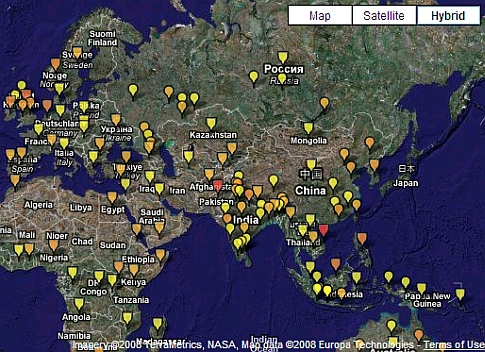

Embarking on a trip to Zimbabwe? You might want to check HealthMap.org, a site that tracks disease pathogens on an international scale, first. A detailed and easy-to-use map designed for the average user to find outbreaks by country and region (although it is also used by local public health officials and clinics), HealthMap started as a disease tracking project about two years ago, but has recently started attracting attention as a top public source of disease information.
HealthMap uses complex algorithms to scan news aggregators such as Google News to find a new pathogen name, location, severity, and other data. You can select the aggregator, and the disease, and view according to a timeline and by geographic region. It’s essentially a mash-up of Google maps and Internet news, but not as a homespun concoction: it’s highly useful and accurate.
Site creators Clark Freifeld (a research software developer in informatics at Boston’s Children’s Hospital) and John Brownstein (an assistant professor of pediatrics at Harvard) know that the aggregator sites are never 100 percent accurate, so they use Bayesian filters (the same ones used for spam filtering) to weed out erroneous data like a Red Sox game with “an outbreak of home runs.” The filter uses “tens of thousands” of reference data points, according to Freifeld, to form more accurate pathogen reports. However, even the filter can still let a misleading or inaccurate report through.
To address that problem, Freifeld is working on a way for users to access the reports and correct information before it is added to the HealthMap database. It’s an example of how the open-source community can potentially save lives, working together on a social engineering platform to provide more accurate data. No one contributor can possibly correct enough pathogen data, but hundreds or thousands of contributors could effectively make the HealthMap site almost completely accurate.
“We have a dictionary of pathogen names, but many of the new diseases are undiagnosed or mislabeled, or are not identified by their local name or in the local language,” Freifeld told Popsci.com. “We also are trying to make the data more region-specific and localized. Think of it as HealthMap with a wiki.”
Whether the wiki experiment will work is still an open issue, but the site offers a tangible benefit that is unquestionably more vital than just a place to chat with friends or find the latest bus routes.
